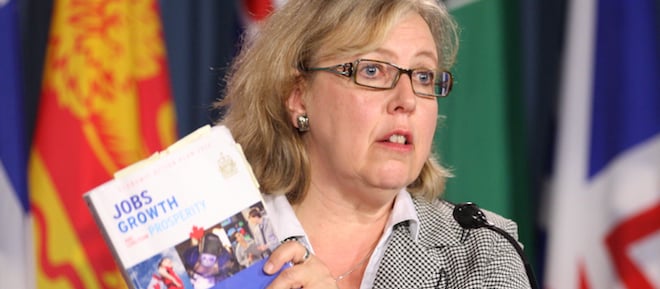How sprawling budget bills threaten parliamentary democracy
All signs point to another omnibus budget, writes Aaron Wherry
Green Party leader Elizabeth May holds a copy of Bill C-38 as she speaks about the budget bill in Ottawa on Monday, June 11, 2012. THE CANADIAN PRESS/Adrian Wyld
Share

On Jan. 26, 1971, Speaker of the House Lucien Lamoureux presented two existential questions to the House of Commons. “Where do we stop?” he asked. “Where is the point of no return?” Lamoureux was responding to a point of order raised about Bill C-207, the Government Organization Act. The complaint concerned the omnibus nature of the bill—that the legislation in question contained several distinct and unique measures that would be better dealt with separately. While the speaker was sympathetic to the arguments presented, he ultimately ruled that the bill was in order—but not without a caveat that should ring in the ears of every current member of Parliament. “I would have to rule—if I must rule—that the government has followed the practice that has been accepted in the past, rightly or wrongly,” he said, “but that we may have reached the point where we are gong too far and that omnibus bills seek to take in too much.”
Forty-two years later, Lamoureux’s questions remain unanswered, at least officially. And it is in the absence of answers that our parliamentary democracy has come to be tested each spring with the presentation of a new budget.
The quandary of omnibus legislation returned to the fore last year with C-38 and C-45, the two budget implementation acts, tabled in the spring and fall, respectively. Each numbered more than 450 pages and contained dozens of measures. And each, in protest, was subject to hours of voting as the opposition parties sought to bring attention to both the controversial changes contained therein and the highly questionable design of the bills themselves.
Though omnibus bills that deal with related measures (the Harper government’s omnibus crime bill, for instance) can be defended, the sprawling budget bills raise several concerns: they put numerous and disparate measures—everything from environmental regulations to abolishing Canada’s spy watchdog—to a single vote, and severely test the ability of MPs to properly review such myriad elements.
And their use by the Harper government has only grown. To put it in perspective, between 1994 and 2005, the 12 budget implementation bills passed with the Liberals in power averaged just under 74 pages. Under the Conservatives, such bills have swollen exponentially. In 2006, the Conservatives tabled two budget bills totalling more than 300 pages. In 2007, the two bills combined for more than 500 pages. In 2009, more than 600 pages. In 2010, more than a thousand pages—including a single bill, C-9, that numbered 904 pages. While efforts were made to split up C-9, they languished. With the government in a minority position at the time, any effort to amend or defeat a budget bill could have been considered a confidence measure, and may have triggered yet another election.
With the Conservatives now holding a majority, it is impossible to block the government from ramming through massive omnibus budget bills, but the Opposition has stepped up its efforts to highlight the threat these measures pose to the principles of parliamentary democracy. The result has been the spectacle of MPs stuck in the House through the wee hours of the morning, voting over and over again on the hundreds of clauses contained in each bill. Coupled with an estimates process that is broken—impairing the ability of MPs to properly scrutinize government spending—the annual budget has become a mark of the disrepair we have allowed our House to fall into. And like prorogation before, the Conservatives have turned a possibly arcane matter of procedure into a widely acknowledged concern.
In the wake of so much controversy last year, it has been suggested that the next budget bill will be somehow smaller. But after years of such massive bills, a smaller budget bill is now relative (oh, for the days of 1994, when a single budget-implementation act of 24 pages was passed). And having registered their objections so loudly last year, the opposition parties would seem to have established a principle that compels them to fight each and every time an egregious bill is presented. Expect more such battles this year.
In 1994, 23 years after Speaker Lamoureux posed his questions, they were invoked by a young Reform Party MP. “I submit to you that it has become a standard practice with governments to bring in omnibus legislation following every budget under what we might call the kitchen-sink approach,” the MP complained. “In the interest of democracy, I ask: How can members represent their constituents on these various areas when they are forced to vote in a block on such legislation and on such concerns?”
That question, too, remains unanswered, even if that MP is now Prime Minister. But then perhaps Stephen Harper, in testing the limits these last few years, has brought us to the point at which we must figure out what kind of Parliament—what kind of democracy—we want.